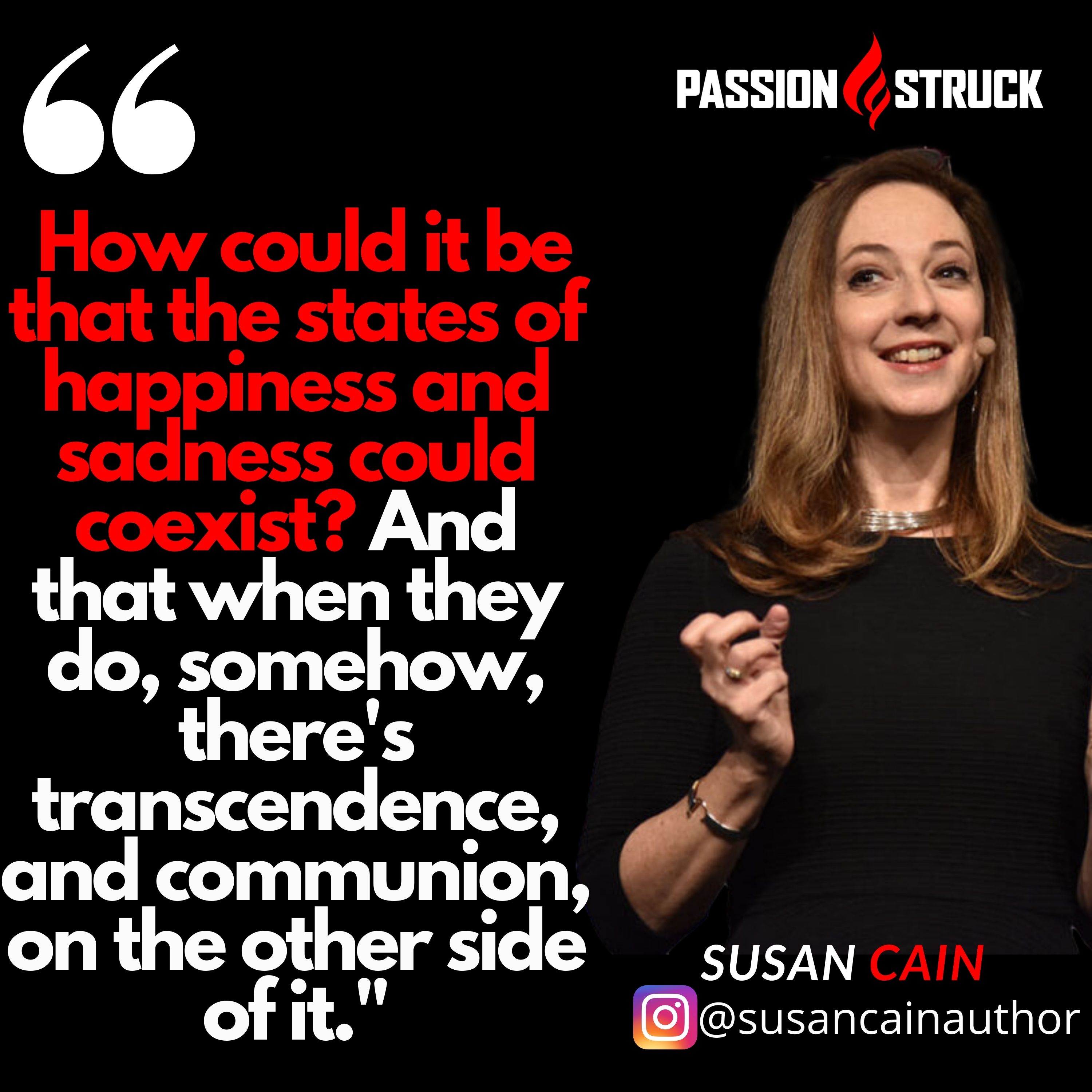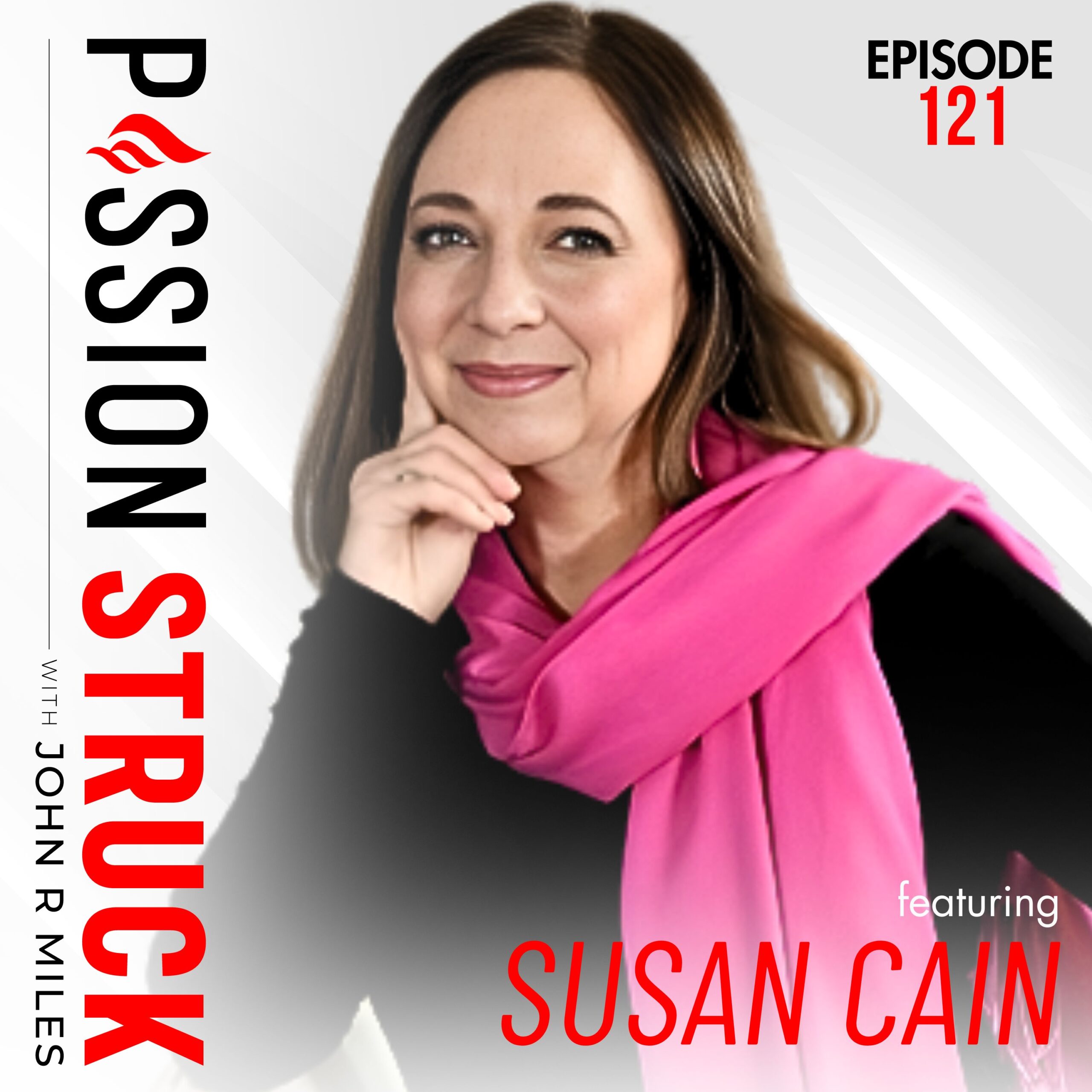Susan Cain, #1 New York Times bestselling author of Quiet, joins Passion Struck to explore her new masterpiece, Bittersweet: How Sorrow and Longing Make Us Whole.
In this episode, we dive deep into:
• Why we’re wired to respond to sadness the same way we breathe
• How melancholy and longing fuel creativity and transcendence
• Why “enforced positivity” is making us miserable
• Susan’s personal story about her mother and inherited pain
• The science of the vagus nerve and the compassionate instinct
If you loved Quiet, you need to hear this conversation.
Susan’s first record-smashing TED Talk has been viewed more than 40 million times and was named by Bill Gates as one of his all-time favorite talks (and if you like that one, you should check out her most recent TED Talk with violinist Min Kym). LinkedIn named her the sixth most influential influencer in the world, just behind Richard Branson and Melinda Gates.
In Bittersweet, Susan Cain discusses why sadness and the happiness of the melancholy are key to achieving self-transcendence and the union between souls. As with the majority of people, you’ve probably been taught your entire life to look at the positive side and be happy no matter what. While there is a place for optimism and looking at the bright side, burying your melancholy and sadness may actually be doing you a terrible disservice.
Hear the secrets and philosophy of the World’s GREATEST high achievers every Tuesday and tune in each week for an inspirational Momentum Friday solo message.
Our impulse to respond to other beings’ sadness sits in the same location as our need to breathe, digest food, reproduce, and protect our babies; in the same place as our desire to be rewarded and to enjoy life’s pleasures.
Susan Cain
Like this show? Please leave us a review here – even one sentence helps! Post a screenshot of you listening on Instagram & tag us to thank you personally!
What Is Bittersweet? Susan Cain Explains
Bittersweet is the quiet recognition that light and dark, birth and death, joy and sorrow are forever tied together.
It is the piercingly beautiful ache you feel when you hear a certain song, watch the sun set, or say goodbye to someone you love. It is the understanding that life is finite, that everything passes, and that this very impermanence is what makes everything matter so fiercely.
As Susan Cain describes it in our conversation:
“We have this idea that the proper way to live is to be happy all the time. But the truth is that sorrow and longing are not detours from the main road. They are the main road. When we accept that, we stop running from pain and start transforming it into creativity, connection, and love.”
In other words, a bittersweet outlook does not deny sadness. It leans into it and finds, on the other side, a deeper kind of joy.
Cain calls this “the happiness of melancholy.” It is why minor-key music can make us cry and feel uplifted at the same time. It is why we tear up at weddings and graduations. And it is why embracing the bittersweet is the fastest route to transcendence, the feeling of being part of something larger than ourselves.
In Bittersweet, Cain shows that this state is not weakness or depression. It is a superpower, one our culture has trained us to suppress, but one that artists, innovators, and the most connected people have always quietly relied on.
Ready to stop forcing constant positivity and start living a fuller, truer life? Keep reading or jump straight to the full conversation with Susan Cain below.
Starter Packs
New to the show? These Starter Packs are collections of our most popular episodes grouped by topic, and we now have them on Spotify. You can also browse starter packs for existing listeners to find your old favorites. Every week, John interviews fascinating high achievers at the top of their game. Learn how to subscribe to the show and never miss a new episode or topic.
Like this? Please subscribe, and join me on my new YouTube platform for peak performance, life coaching, and personal growth: https://www.youtube.com/c/JohnRMiles/.
More About This Show on the Happiness of Bittersweet with Author Susan Cain
I asked Susan Cain why we needed to concentrate more on the whole idea of bittersweetness.
Susan explains, “The message that we are sending our kids and our adult selves, the messages that when things are going well, that’s the main story. And when you experience sorrow or longing, that’s a detour from the main road. If we could instead understand that it’s all the main road, then what that would do is normalize our experiences. When difficult things would come to us, we would be able to experience them very differently, and also look at other people’s difficulties in a more open way, because we wouldn’t find them so scary, or so distasteful.”
Susan Cain on Raising Children to Value Melancholy
I asked Susan how parents can help kids grow up emotionally whole in a culture that treats sadness like a defect.
Her answer stopped me in my tracks:
“We need to normalize it for them from the very beginning, not in a heavy way, but in a matter-of-fact way: this is part of life.
The years they’re under our roof, wrapped in parental love, are the safest time to gently expose them to what the world actually holds. So that when loss, longing, or disappointment finally arrives (and it will), they’re not shocked or ashamed. They recognize it as part of the deal.
Joy is part of the deal, too, of course. But if we only teach them one half of the story, they’ll spend their lives running from the other half, or worse, feeling broken when it shows up.
The greatest gift we can give our children is to hand them the full emotional map while we’re still there to walk it with them.”
That single idea (expose them gently while they still have us) is one of the most powerful pieces of parenting advice I’ve ever heard.
Because a child who learns early that tears and longing are normal becomes an adult who can sit with someone else’s pain instead of looking away.
And that, more than any trophy or perfect report card, is what the world actually needs.
Thanks, Susan Cain!
If you enjoyed this interview with Susan Cain, let her know by clicking on the link below and sending her a quick shout on Twitter or Instagram:
Click here to thank Susan Cain on Instagram!
Click here to let John R. Miles know about your number one takeaway from this episode!
And if you want us to answer your questions or you have a topic you would like John to discuss on one of our upcoming weekly Momentum Friday episodes, drop us a line at [email protected].
LINKS
Please note that some of the links on this page (books, movies, music, etc.) lead to affiliate programs for which The Passion Struck podcast receives compensation. It’s just one of the ways we keep the lights on around here. Thank you so much for being so supportive

*Website: https://susancain.net/newsletter/
* Twitter: https://twitter.com/susancain/
*Facebook: https://www.facebook.com/authorsusancain/
*LinkedIn: https://www.linkedin.com/in/susancain/
About Today’s Guest Susan Cain

With her viral TED2012 talk and her bestseller “Quiet,” Susan Cain urged our society to cultivate space for the undervalued, indispensable introverts among us. Now, she’s back to explore the surprising lessons sorrow and longing teach us about creativity, connection, and love. She is now doing it again with her new book, “Bittersweet.”



